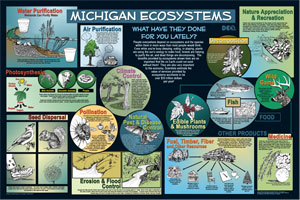Ecosystems and Biodiversity Lesson 6 : Michigan's Web of Life
Parts of this activity adapted, with permission, from the Canadian Parks and Wilderness Society (CPAWS)—Calgary/Banff Chapter Education Program. For more information about CPAWS, visit http://www.cpaws.orgp, and for educational activities, visit: http://www.cpaws-southernalberta.org/education/edu_resources.php
Lesson Overview
Students use a ball of twine to create a forest ecosystem “web of life,” illustrating interdependence within a natural community and the importance of diversity within it. Students are then introduced to the concept of biodiversity and its importance.
Students answer the following essential question as they investigate Michigan’s biodiversity and its importance: Why is biodiversity important?
Subject/Target Grade
Science and Social Studies/ Upper Elementary & Middle School (4-6)
Duration
60 minutes – Classroom setting
Materials
per class
• 1 ball of twine or string
• 1 set of Forest Ecosystem Picture Cards (32 cards)
• Michigan Biodiversity (transparency master)
• Michigan Ecosystems: What Have They Done for You Lately? poster

What have they done for you? poster
per student
• Michigan Biodiversity Blitz (student activity)
Michigan Grade Level Content Expectations
Science:
• Demonstrate scientific concepts through various illustrations, performance models, exhibits, and activities. S.RS.04.11
• Describe the effect humans and other organisms have on the balance in the natural world. S.RS.04.18, S.RS.05.17, S.RS.06.17
• List examples of populations, communities, and ecosystems including the Great Lakes region. L.EC.06.11
• Predict how changes in one population might affect other populations based upon their relationships in the food web. L.EC.06.23
• Describe how human beings are part of the ecosystem of the Earth and that human activity can purposefully, or accidentally, alter the balance in ecosystems. L.EC.06.41
Social Studies:
• Explain how and why ecosystems differ as a consequence of differences in latitude, elevation, and human activities. 6 – G3.2.1